Opinion: Even without major surprises, these Oscars delivered big questions
- Oops!Something went wrong.Please try again later.
- Oops!Something went wrong.Please try again later.
- Oops!Something went wrong.Please try again later.
- Oops!Something went wrong.Please try again later.
- Oops!Something went wrong.Please try again later.
- Oops!Something went wrong.Please try again later.
Five CNN Opinion culture critics share their takeaways from the 96th Academy Awards. The views expressed in this commentary are their own.
Gene Seymour: Hollywood’s next existential question
Most of the big, expensive movies walked away with Oscars Sunday night. But at least one award winner used his narrowly allotted time for an acceptance speech to argue that movies don’t have to be big or expensive to succeed.
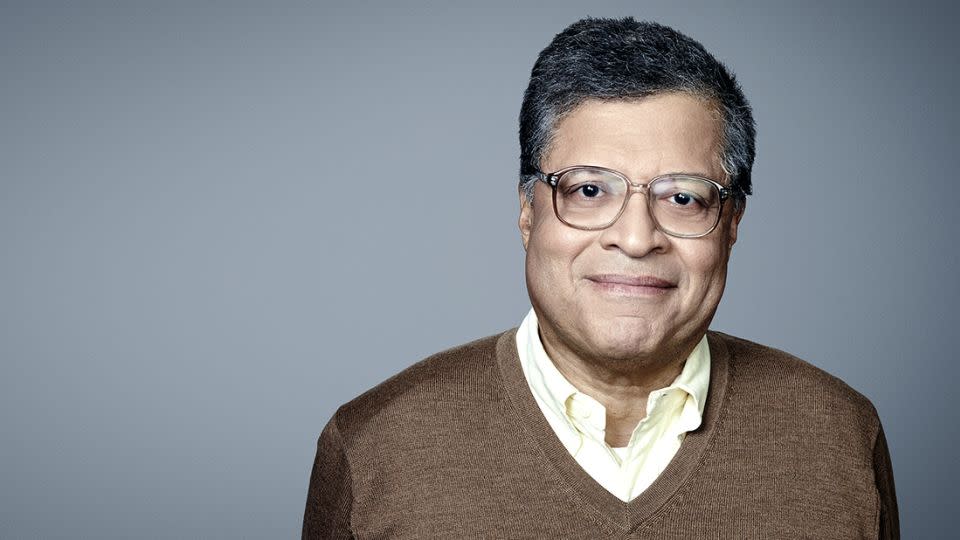
Cord Jefferson won the Academy Award for best adapted screenplay for his critically acclaimed directorial debut, “American Fiction.” This brainy, gently subversive satire about a Black professor’s desperately fraudulent bid for big-time literary success was made with a budget of what its writer-director said was “significantly less than $10 million.”
“I understand this is a risk-averse industry. I get it,” Jefferson said in his acceptance speech. “But $200 million movies are also a risk…[and] you take the risk anyway. It doesn’t always work out. But you take the risk anyway.”
So, Jefferson proposed that “instead of making one $200 million movie, try making 20 $10 million movies. Or 50 $4 million movies.” Jefferson said he wanted “to acknowledge and recognize that there are so many people out there who want the opportunity I was given.”
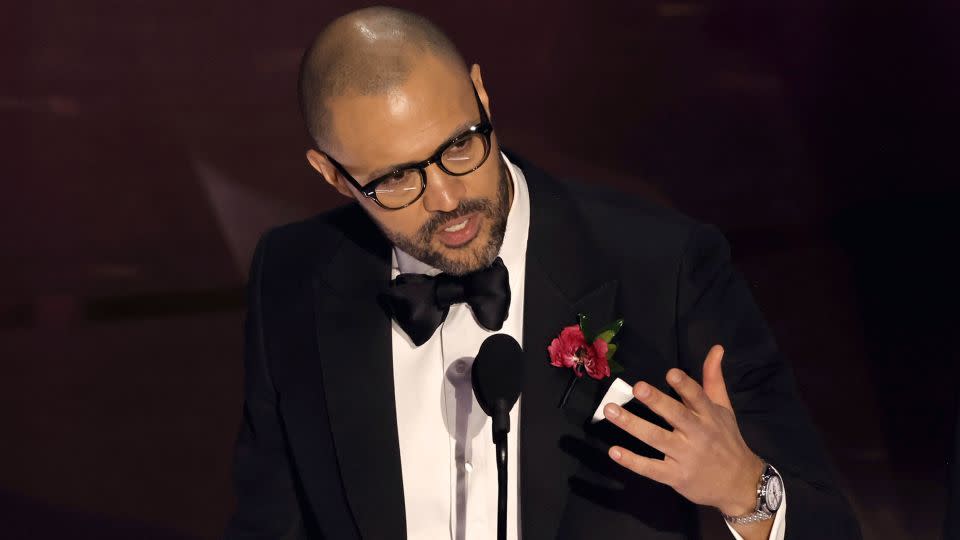
For some perspective, consider last summer’s studio blockbuster tandem of “Oppenheimer,” which led all contenders with seven Oscars, including best picture, best director (Christopher Nolan), best lead actor (Cillian Murphy) and best supporting actor (Robert Downey Jr.) and “Barbie,” whose best song winner “What Was I Made For?” by Billie Eilish and Finneas O’Connell provided its only prize of the night. (CNN and the distributor of “Barbie” share a parent company, Warner Bros. Discovery.)
But both movies were winners at the box office; even with budgets exceeding $100 million, they both made back more than three times that amount in returns worldwide.
Such resounding coups would seem to validate more blockbusters to come. But the big question for many in the movie business, especially following a long and bruising work stoppage throughout most of 2023 because of contract disputes with writers and actors, is whether Hollywood will, or even should, continue to stake its future on films made with $100 million or $200 million budgets.
As far back as a decade ago, even legendary directors George Lucas and Steven Spielberg were predicting an “implosion” in the film industry through which, in Spielberg’s words, “three or four mega-budget movies are going to go crashing into the ground and that’s going to change the paradigm.” Remember that this was in 2013 and, in the decade since, blockbusters, many of them featuring superheroes, have still become global moneymaking properties.
Still, as a New York Times essay by Mark Harris contended just a couple weeks ago, as with many industries the movie business has in the last year been in a phase of “downsizing, diminishment, shelving, sidelining, retrenching, retreating and bet-hedging” with producers being warned to keep “expectations at a base level.”
Which sounds dire. On the other hand, maybe this is precisely the kind of uncertainty that could encourage the industry to take chances that Jefferson is encouraging. If there’s a void to be filled in theaters or other platforms, the vacuum could be inhabited by the kind of risky-but-frisky moviemaking embodied by “American Fiction” or other small, smart projects searching for space in whatever pipelines are open.
It’s like…well, imagine you’re driving a gas-guzzling SUV that’ll still get you to a couple of places out-of-state, but is otherwise a little shaky. You promise the family that the next car will, for sure, be totally electric. That’s right. Not a hybrid. A full plug-and-go vehicle.
Another year goes by. Then another. Not too much time passes before the big car expires. Dies. Can’t and won’t move. What then? Well, you could still go hybrid. Or go full electric.
Either way, you’ll have to do something. And so will Hollywood.
Gene Seymour is a critic who has written about music, movies and culture for The New York Times, Newsday, Entertainment Weekly and The Washington Post. Follow him on Twitter @GeneSeymour.
Sara Stewart: “Barbie” still managed to break through
As the Oscars ran into the show’s third hour, two things became clear: “Barbie” wasn’t going to win much — and “Barbie” still reigns as the most entertaining movie of the year.

The musical high point of the show (and arguably the high point, period) was Ryan Gosling’s rollicking performance, with his cast of supporting Kens, of “I’m Just Ken.” And yet it seemed something like poetic justice that it was a woman, Billie Eilish, who, with her brother Finneas O’Connell, took home the Oscar for best original song from the movie.
Their “What Was I Made For?” is a sweet and melancholy ballad, and Eilish – at 22, the youngest person ever to win two Oscars – said in her speech that she was “grateful for this song and this movie and the way that it made me feel.”
“This goes out to everyone who was affected by the movie and how incredible it is,” Eilish said.
Because for all the 11th-hour lip service to the greatness of “Oppenheimer” and how people should stop complaining about “Barbie” being snubbed, it was Greta Gerwig’s movie that gave a lot of us all the feelings: laughter, tears and bitter recognition, alongside towering cinematic escapism. Not just for women, either. Like, a lot of people. Period. Actually, the most people, by far. Watching Gerwig and Margot Robbie relegated to sitting in the audience to politely laugh at Jimmy Kimmel’s jokes about “Barbie” snubs seemed, you know, a little on the nose.
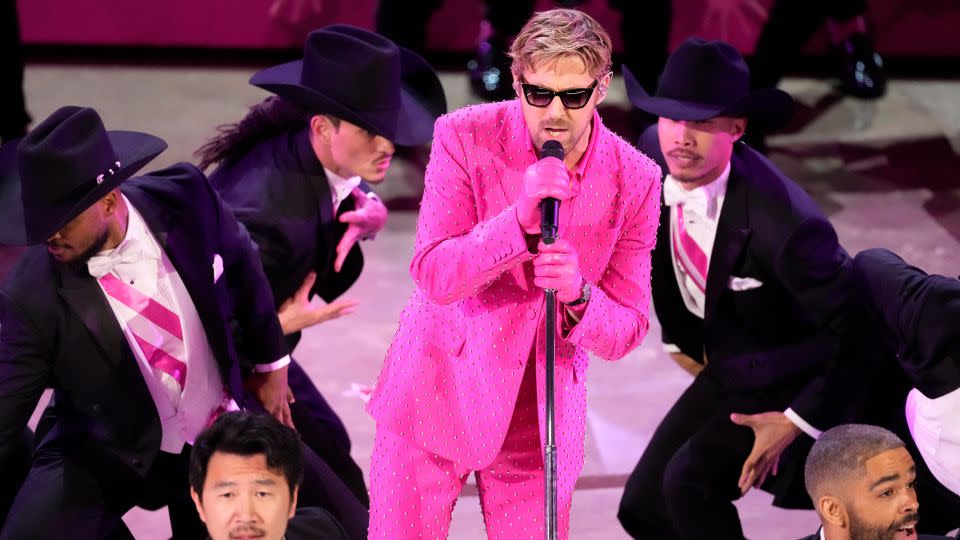
But Gosling – who has made his feelings clear about Gerwig and Robbie’s snubs – did the film proud in bedazzled pink, and Eilish gave a vulnerable, lovely performance and speech. Rita Moreno delivered a spicy ode to best supporting actress nominee America Ferrera, noting that her monologue from “Barbie” was one of the most memorable film moments. And, I’d add, it was during a year that saw a dispiritingly low number of women in top roles and behind the camera.
Let’s be honest: the Academy has never been big on movies that are fun. Or by and about women. “Barbie” may not have dominated the awards, but I’m betting it gets watched a lot more, in years hence, than the one that just scooped up most of the major awards.
Sara Stewart is a film and culture writer who lives in western Pennsylvania.
Jeff Yang: I’d rather have an entertaining train wreck than an Oscars like this
Yes, the Oscars are an awards show, but they’ve also been more often than not a hot mess. Across nearly a century of its existence, no televised honors event has been quite as likely to deliver an eye-popping, jaw-dropping moment: Jack Palance doing one-armed pushups after winning the best supporting actor trophy in 1992. Host Seth McFarlane grossing out every woman in the audience with his musical ode to onscreen nudity in 2013. Chris Rock dragging a trio of blinking Asian American kids on stage to make a Chinese sweatshop joke in 2016. Presenter Warren Beatty taking the wrong envelope before he and Faye Dunaway announced the wrong winner for best picture in 2017, leading the producers of “La La Land” to momentarily think they’d won over “Moonlight.” Will Smith slapping Chris Rock across the face for making a joke about his wife Jada Pinkett Smith: That happened just two years ago!

The awards’ long history as a magnet for scandal, controversy and terrible choices in general is probably why this year’s show felt calculated to be as locked-down, conventional and vaguely throwback as possible. We had Jimmy Kimmel: a safe and mostly edgeless choice of host, equally at home tossing out scripted dad jokes and sponsor plugs (“A brand-new ‘Abbott Elementary,’ right after this broadcast!”). There were extremely expected presenter pairings: “Beetlejuice” topliners Catherine O’Hara and Michael Keaton! Twinsies Arnold Schwarzenegger and Danny DeVito, together again! Presenters served up warmed-over Golden Age of Sitcoms schtick, with a particularly cringey example being old pals Melissa McCarthy and Octavia Spencer having to do a bit in which Disney cartoon chipmunks Chip ‘n Dale were mistaken for the bare-chested bachelorette-party Chippendales.
Things started an hour early. Everyone kept their speeches short and tight and uncontentious. Everything was pushed ahead at a brisk, racewalking pace. All of this made the handful of unscripted, human moments stand out. Like Cord Jefferson pleading with Hollywood to make more small, creative movies instead of a small number of blockbusters in his best adapted screenplay acceptance speech for “American Fiction.” The wild glee of the “Godzilla Minus One” crew upon winning their visual effects award — and the reveal upon taking the stage that each of them was carrying a miniature golden Godzilla and wearing matching “monster claw” shoes. The desperate brain-freeze of Billie Eilish as she accepted the best song trophy shared with brother Finneas O’Connell, and her honk of nervous laughter that broke the ice. (Not to mention Eilish dedicating the award to “Mrs. T.,” the teacher who “didn’t like her but was good at her job.”)
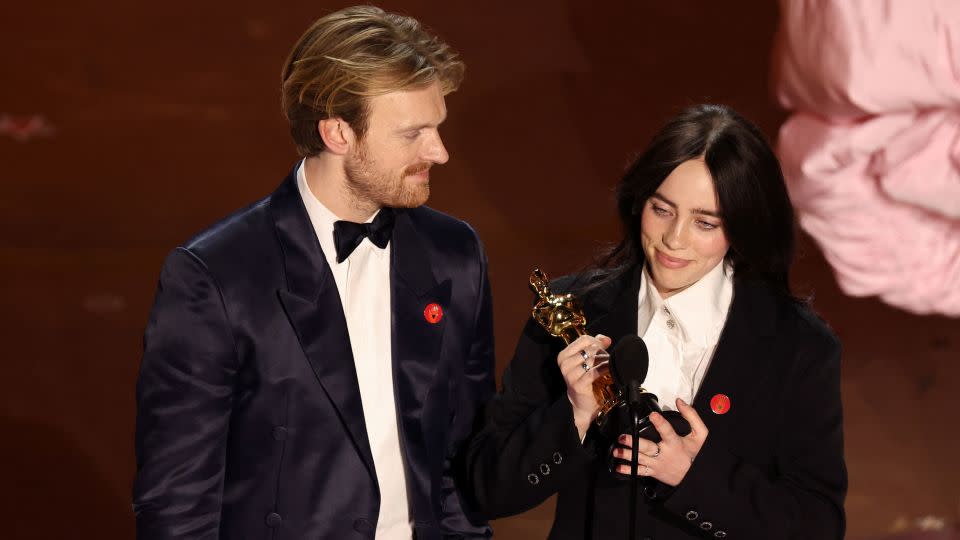
But these touches were few and far between in what felt like a clinically controlled evening. Two other moments that threatened to make things interesting — Kimmel bringing a squad of Teamsters and International Alliance of Theatrical Stage Employees union members on stage to honor their contributions and assert that the other Hollywood unions would stand with them in their labor negotiations, and Kimmel later reading aloud a thumbs-down “review” of the show in progress posted online by former President Donald Trump, culminating in the host quipping, “Isn’t it past your jail time?” — were quickly swept away by the proceedings.
Speaking of quickly sweeping away: The culmination of the evening, the best picture award, presented by Al Pacino in commemoration of the 50th anniversary of “The Godfather Part II” (another throwback!), ended up being a huge anticlimax after Pacino opened the envelope and revealed the winner — “Oppenheimer” — without waiting for the nominees to be named or receive screen time. It was a mess, but hardly a hot one — just puzzling and sad. I feel for “Past Lives” director Celine Song, who ended up not getting mentioned or receiving any screen time at her first Oscars. And as a result, the show finished well ahead of schedule.
Give me an entertaining train wreck that runs long over a safe bowl of oatmeal that ties up early anytime.
Jeff Yang is a frequent contributor to CNN Opinion. He co-hosts the podcast “They Call Us Bruce” and is co-author of the bestselling book “Rise: A Pop History of Asian America from the Nineties to Now” and author of “The Golden Screen: The Movies That Made Asian America.”
Noah Berlatsky: Lily Gladstone deserved better
Before this year, no Native American performer had ever won an award in an acting category at the Oscars. Many fans were hoping that this year would change that.
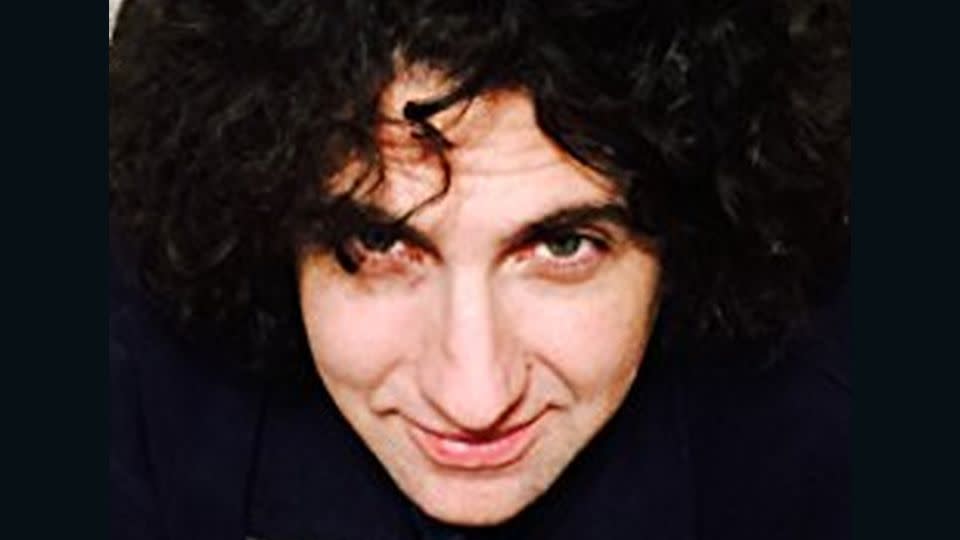
But it didn’t. After winning a Golden Globe and a Screen Actors Guild award this season for portraying Mollie Burkhart in “Killers of the Flower Moon,” indigenous actor Lily Gladstone lost to Emma Stone for the best actress Oscar.
The Academy is doing better with diversity in some respects, visible Sunday night in Cord Jefferson’s win for best adapted screenplay for “American Fiction,” Da’Vine Joy Randolph’s award for best supporting actress for “The Holdovers” and Justine Triet’s best original screenplay win for “Anatomy of a Fall.” In her speech, Randolph said, tearfully, “I thank you for seeing me.” That’s an acknowledgement that the Oscars have not been great at seeing Black women in the past, and have made some steps forward in the present.
Not enough steps forward for Gladstone this year, though. The Oscars certainly deserve some blame for once again ignoring a Native performer. But Gladstone was also in many ways failed, and robbed, by her own film.
Martin Scorsese’s “Killers of the Flower Moon” is a story about a series of horrific racist murders in the Osage Nation of Oklahoma. Gladstone plays Burkhart, a woman whose husband Ernest (Leonardo DiCaprio) betrays her and murders her family members to get access to Osage oil rights.
The film should be Mollie’s story. But instead, Scorsese focuses mostly on the perspective of Burkhart’s husband. Gladstone expresses love, grief and betrayal powerfully, but she’s sidelined for long stretches in a film that was clearly designed as a vehicle for DiCaprio and costar Robert DeNiro (who was nominated for best supporting actor).
In contrast, Yorgos Lanthimos’s “Poor Things” is a spectacular showpiece for Emma Stone’s character Bella. She’s onscreen practically every moment in a role that has her grow from infant-like innocent to horny adolescent to self-actualized woman in a tour de force performance.
The irony here is that, given Gladstone’s earlier awards-season success, it seems likely that if Scorsese had gotten out of his comfort zone and let her helm the film, he probably would have gotten at least one Oscar, and possibly more. Instead, “Killers of the Flower Moon” was shut out of wins entirely, overwhelmed by the night’s big winners “Oppenheimer” and, of course, “Poor Things.”
The questions confronting this industry remain: Whose stories get to be told and who gets rewarded for telling them and how? The Academy has failed Native actors for decades, as have many directors, producers and money men. The Oscars still need to be less White. Hollywood does too.
Noah Berlatsky (@nberlat) is a freelance writer in Chicago.
Holly Thomas: Convention isn’t Robert Downey Jr.’s thing
“I’d like to thank my parents,” occupies similar territory in Oscars speeches to “Isn’t the bride beautiful” in wedding toasts: It’s not necessarily true, but it’s all but compulsory. Convention isn’t Robert Downey Jr.’s thing, though. In accepting his best supporting actor award with a deadpan “I’d like to thank my terrible childhood,” the actor reflected the emotional honesty that’s powered him to superstardom - and finally, an Oscar win for his role in “Oppenheimer.”

Actors can be loosely divided into chameleons and peacocks: those who are unrecognizable from role to role, and those whose singular dazzle is the point of going to the movies. Robert Downey Jr. falls solidly into the latter camp. His fragile magnetism in “Less Than Zero,” the 1987 movie loosely based on Brett Easton Ellis’s novel of the same name, turned a mediocre project into something worth watching, if only for his sake. It was no wonder he portrayed a troubled young addict so effectively: His father reportedly offered him his first tug of a joint - as a white wine chaser - when he was just 6 years old.
No one should be nostalgic for the days when child actors were habitually given booze and drugs. There’s no mystic alchemy that turns abuse into talent. Today’s most gifted young stars (Timothee Chalamet, Austin Butler, Florence Pugh, Zendaya - basically the cast of “Dune: Part Two”) are no less compelling for seeming well-adjusted. But you get the sense that for Downey Jr., the total mess of his upbringing made any professional grandiosity pointless. That humility has served him well. In taking on the superficially unchallenging role of Tony Stark in 2008’s Iron Man after years in the career wilderness, Downey Jr. made himself a superstar — and propelled the Marvel juggernaut that’s flagged ever since his departure.
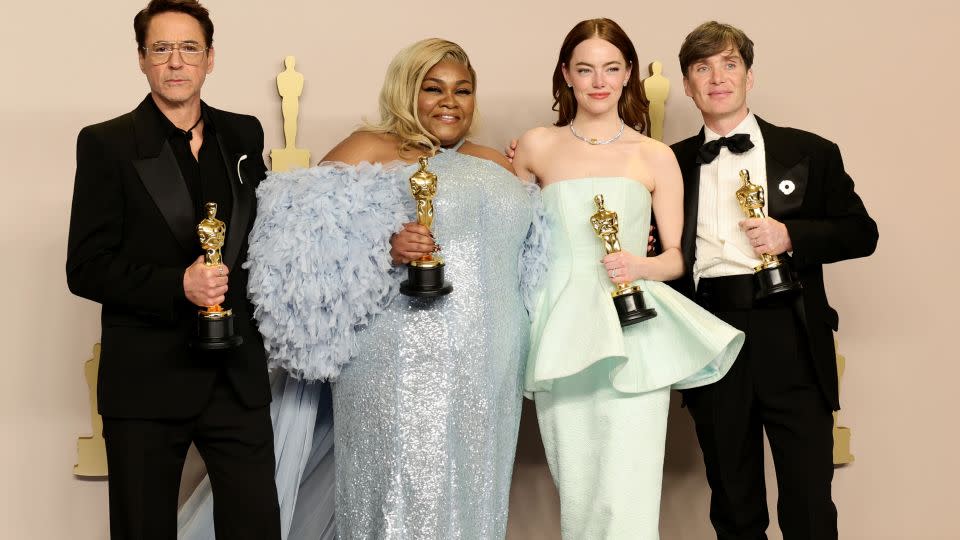
Robert Downey Jr. has always deserved an Oscar. He just needed the stars to align. “Oppenheimer” is a great movie, but Lewis Strauss is far from the most interesting character in it. Downey Jr. breathed life into him. That life, that raw intensity, is what’s always set him apart.
Holly Thomas is a writer and editor based in London. She is morning editor at Katie Couric Media. She tweets @HolstaT.
Update: An earlier version of this article had the incorrect date of Will Smith slapping Chris Rock.
For more CNN news and newsletters create an account at CNN.com

